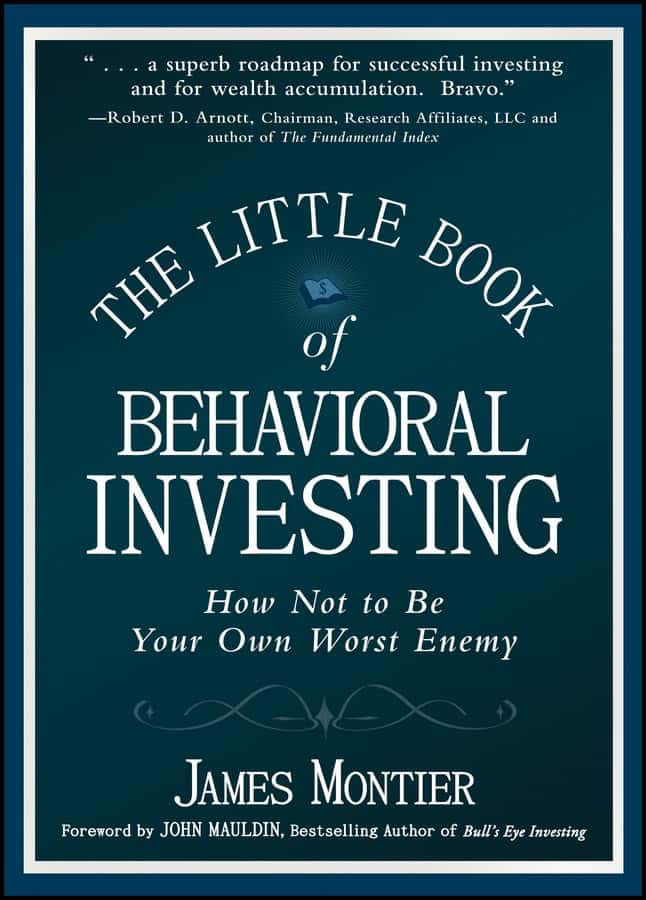Overview : The Little Book of Behavioral Investing
-
Book Title: The Little Book of Behavioral Investing
-
Author: Benjamin Graham and David Dodd
-
Publication Date: James Montier
-
Rating: 4.5
-
price: $15.76
-
Pages: 236
About the Author
The Little Book of Behavioral Investing, authored by James Montier, delves into the psychological aspects of investing, helping readers understand common biases and mistakes that can impact investment decisions. It provides practical insights to manage emotions and improve decision-making for better long-term results.
The Little Book of Behavioral Investing Book Introduction
The Little Book of Behavioral Investing, Unveiling the Psychology of Investing In the complex world of finance and investing, where numbers and rational analysis often take center stage, James Montier's "The Little Book of Behavioral Investing: How Not to Be Your Own Worst Enemy" shines a light on the crucial yet often overlooked human element. This insightful book delves into the fascinating realm of behavioral finance, offering readers a unique perspective on how psychological factors influence investment decisions. written by James Montier, is a compelling exploration of the psychological factors that influence investment decisions. Published in February 2010, this book delves into the field of behavioral finance, shedding light on the cognitive biases and emotional responses that often lead investors astray. Montier's work is particularly relevant for finance professionals as it provides both theoretical insights and practical strategies to improve investment outcomes by understanding and mitigating these biases. In a field where rational decision-making is paramount, Montier's insights offer valuable guidance for navigating the often irrational behaviors exhibited in financial markets.
The Little Book of Behavioral Investing Book Summary
Montier, a respected authority in behavioral finance, expertly guides readers through the psychological pitfalls that can derail even the most seasoned investors. The book's central premise is that understanding and managing our own behavioral biases is just as important as mastering financial analysis when it comes to successful investing.
Key themes explored in the book include:
- Overconfidence and its impact on investment decisions
- The dangers of confirmation bias in market analysis
- Loss aversion and its influence on portfolio management
- The importance of patience and humility in investing
Analysis of Core Concepts
Overcoming Psychological Biases
Montier's exploration of psychological biases is both comprehensive and engaging. He breaks down complex concepts into digestible chunks, making it accessible for readers of all backgrounds. For instance, his discussion on overconfidence is particularly illuminating, showing how even experienced investors can fall prey to overestimating their knowledge and underplaying risks.
"The human mind is a pattern-seeking machine. It will find patterns where none exist if you let it."
This quote encapsulates Montier's approach to understanding and combating cognitive biases in investing. He provides practical strategies to mitigate these biases, such as using checklists and maintaining a disciplined investment process.
The Role of Emotions in Market Trends
Montier's analysis of how emotions drive market trends is particularly relevant in today's volatile financial landscape. He draws parallels between historical market bubbles and current trends, including the recent surge in cryptocurrencies, to illustrate how emotional decision-making can lead to irrational market behavior.
Writing Style and Accessibility
Despite tackling complex psychological and financial concepts, Montier's writing style remains engaging and accessible. He skillfully weaves academic research with real-world examples, making the book appealing to both novice investors and seasoned professionals. His use of anecdotes and case studies helps readers connect theoretical concepts with practical applications in personal finance and investing.
The Little Book of Behavioral Investing Strengths and Weaknesses
Strengths:
- Comprehensive coverage of behavioral finance concepts
- Practical advice for overcoming psychological biases
- Engaging writing style that makes complex ideas accessible
- Relevant examples from various market trends and personal finance scenarios
Weaknesses:
- Some readers might find the focus on psychology overwhelming compared to traditional financial analysis
- Limited coverage of specific investment strategies or market analysis techniques
The Little Book of Behavioral Investing Book Alternatives
While "The Little Book of Behavioral Investing" shares similarities with other behavioral finance books like Daniel Kahneman's "Thinking, Fast and Slow," Montier's work stands out for its specific focus on investing. Unlike more general personal finance books, Montier's approach is deeply rooted in the psychology of financial decision-making, offering a unique perspective on market behavior and investment strategies.
Compared to traditional investing books that focus primarily on technical analysis or fundamental research, Montier's work provides a complementary perspective that can enhance an investor's overall approach to the markets.
Relevance to Current Market Trends
In an era of algorithmic trading and artificial intelligence in finance, Montier's emphasis on human psychology remains highly relevant. His insights into behavioral biases are particularly pertinent when considering the impact of social media on investment decisions and the rise of retail investing platforms.
The book's discussion on patience and long-term thinking serves as a valuable counterpoint to the short-term focus often prevalent in today's fast-paced financial markets, including the volatile world of cryptocurrencies.
Highlights from The Little Book of Behavioral Investing
Behavioral Biases: Investors often make poor decisions due to emotional and cognitive biases like overconfidence, loss aversion, and herd mentality.
Emotions vs. Rationality: Successful investing requires overcoming emotions like fear and greed to make rational, long-term decisions.
Patience is Key: Short-term market fluctuations can lead to impulsive actions; staying disciplined ensures better results.
Avoid Noise: Filtering out irrelevant market information helps maintain focus on fundamental analysis.
Value of Contrarian Thinking: Going against the crowd often leads to better opportunities as markets tend to overreact.
Stick to a Plan: A well-defined investment strategy minimizes bias-driven mistakes.
Conclusion and Recommendation
James Montier's "The Little Book of Behavioral Investing" is an invaluable resource for anyone looking to improve their investment decision-making process. By shedding light on the psychological factors that influence our financial choices, Montier provides readers with the tools to become more rational and successful investors.
Whether you're a novice investor looking to understand market psychology or a seasoned professional seeking to refine your approach, this book offers valuable insights that can enhance your investment strategy. Its relevance extends beyond traditional investing, offering applicable wisdom for navigating the complexities of personal finance and emerging market trends.
Ready to transform your approach to investing? Click here to purchase "The Little Book of Behavioral Investing" and start your journey towards more informed and psychologically aware investing today!





